
Covid-19 healthcare research
Vascular complications in patients with Covid-19
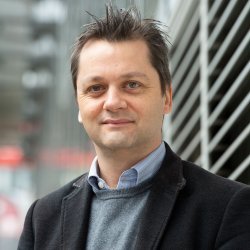
Dr Martin Whyte (pictured) has been admitting and treating patients with Covid-19 throughout the pandemic. Given his interest in type 2 diabetes, early on he proposed that individuals with microvascular complications of diabetes were susceptible to more adverse consequences of Covid-19. He has since advanced important research questions regarding the interplay of diabetes, obesity and Covid-19. Vascular involvement also extends to venous thrombosis in critically-ill patients and Dr Whyte has extended this observation, showing that thrombosis in all hospitalised patients with Covid-19 is common.
Smart Separations launches revolutionary filter technology to destroy viruses
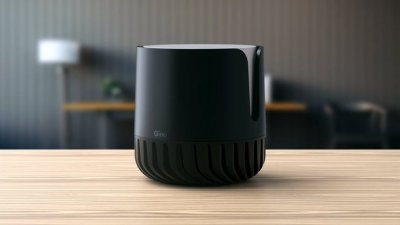
In response to Covid-19, Surrey Research Park tenant business, Smart Separations, a microfiltration company, launched Gino, a personal air sanitiser that destroys microbes in the air.
It uses their ViraTeq™ revolutionary lightless filter coating which is proven against coronavirus and other viruses, bacteria and fungi. Gino has an elegant, unobtrusive and economical design and a very low running cost.
Smart Separations steals show with its Covid-19 solution at European Innovation Council’s ePitching
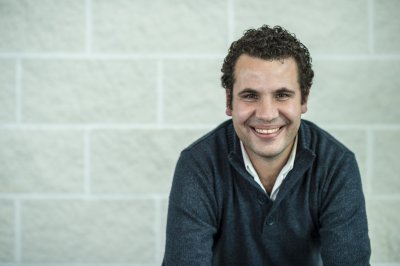
Smart Separations, a microfiltration technology company, based at the Surrey Research Park, is finalising testing on its anti-viral air transmission units which can be used to remove coronavirus and other viruses and bacteria from the air. Smart Separations has just been crowned winner of an e-Pitching session to the European Innovation Council for its nano technology-based smart coating, which destroys viruses, bacteria and mold. It can be used on air and surfaces, two of the main ways that Coronvirus spreads.
Surrey Research Park tenant, The Naked Pharmacy has seen online sales soar as people seek natural solution for mental wellbeing

The pandemic has rapidly accelerated demand for clinically proven food supplements with The Naked Pharmacy seeing online growth of over 400% since lockdown. In 2016, Kevin Leivers, former Chief Pharmacist of global health and beauty brand Weleda, launched The Naked Pharmacy, Europe’s first 100% natural pharmacy. Its Saffrosun product, an organic Saffron extract with prebiotic and food-sourced Vitamin D and B12 which helps alleviate stress and aids better sleep has seen significant increase in demand.
Modelling risk of Covid-19 infection in enclosed settings as part of the Royal Society’s Rapid Assistance in Modelling the Pandemic (RAMP) initiative
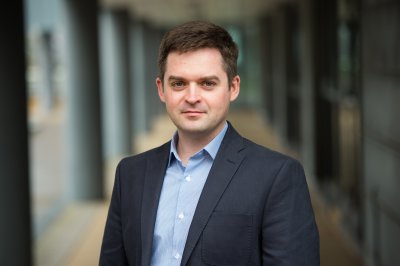
Dr Oleksiy Klymenko (pictured) and Dr Michael Short, in collaboration with PGRs, Ishanki De Mel and Panos Demis, joined the Royal Society’s Rapid Action in Modelling the Pandemic (RAMP) initiative in April. Together with researchers from the Universities of Bath Leeds, they have been developing models that determine risk of Covid-19 infection within enclosed spaces such as offices and public transport. Their models use experimental data from human behaviour, viral survival on surfaces, and transmission via different pathways to assess and guide policies for different environments, including cleaning and how many people should be present in a space and for how long to minimise risk of infection.
Team helps NHS predict levels of care required by patients by looking for tractable biomarkers of disease severity
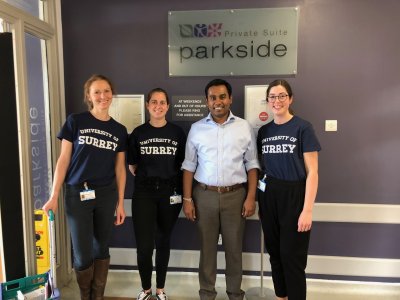
Dr Mel Bailey and colleagues in Chemistry are collaborating with the Immunology Section to collect blood and sebum samples from Covid-19 patients at Frimley Park Hospital. In conjunction with the UK Mass Spectrometry Coalition, they will undertake metabolomics, lipidomics and proteomics. They are looking for tractable biomarkers of disease severity in order to help the NHS predict the levels of care required by patients at early stages of disease. The study is supported by volunteers from Surrey’s Postgraduate research community who received funding from EPSRC.
Investigating functional change of antibodies in Covid-19
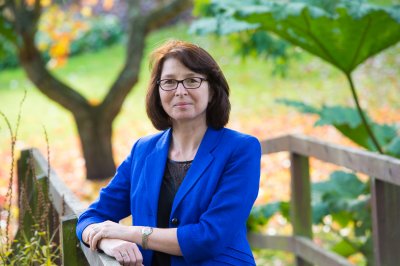
Professor Deborah Dunn-Walters (pictured) and Dr Alexander Stewart are studying blood samples from Frimley Park Hospital to characterise the dynamics of class switching in B cells during Covid-19 infection. This is where disease-specific antibodies change their function, e.g. from IgM to IgG or IgA. This will provide information to inform later studies assessing vaccine responses and may help to identify biomarkers of disease severity. Together with Dr Natalie Riddell and Dr Fernando Martinez Estrada all samples undergo immunophenotyping.
UK-wide research will look at impact of Covid-19 on early cancer diagnosis
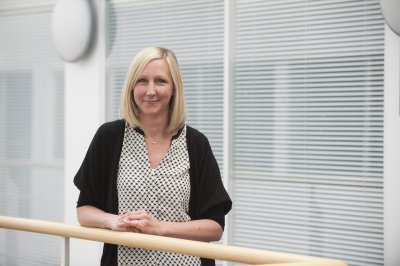
Dr Katriina Whitaker (pictured) is working with the University of Cardiff, King’s College London and Cancer Research UK to understand the impact of Covid-19 on cancer attitudes and behaviours. The message to “stay home, protect the NHS, save lives” and the suspension of cancer screening programmes sent a strong message that “cancer can wait”. This UKRI funded project will help develop clear public health messages to encourage early detection and prevention.
Connecting with nature during times of crisis: Understanding alternative use of spaces of leisure and recreation during lockdown
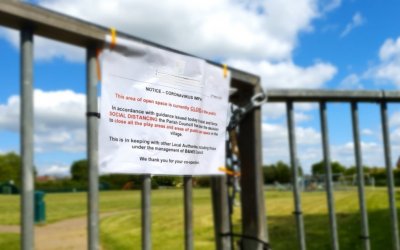
Professor Caroline Scarles and Dr Tracy Xu are working in collaboration with Dr Birgitta Gatersleben and Dr Kayleigh Wyles from the School of Psychology to investigate the impact of COVID-19 on people’s use of local, everyday spaces of leisure and recreation. The research seeks to understand how behaviour during lockdown is significantly different to pre-lockdown behaviours and how experiences during lockdown may influence changes in behaviour going forward. This is an ongoing survey and results will be shared in due course.
Telephone interventions could be used to reduce symptoms of cancer
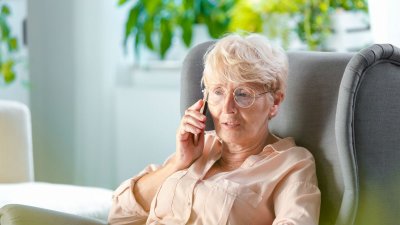
Telephone interventions have potential to successfully treat symptoms of cancer such as fatigue, depression and anxiety, new research in the Cochrane Library reports. Arguably, this could help patients receive the care they need during the current Covid-19 pandemic when face-to-face access to medical professionals is limited. The research, led by Professor Emma Ream from the School of Health Sciences, addressed the many and varied symptoms experienced by people with cancer that can affect wellbeing and mar quality of life.
Surrey academic helps develop privacy focused Covid-19 tracing app

Professor Glenn Parry proposed a privacy-preserving tracing app, using technology from his previous research, in the Hack-From-Home COVID19 hackathon. 822 participants from 62 countries joined and the team he helped form won the event with their HealthTraffic app. The collaborators, now led by Case Western University, were granted £7,000 and have created the ShareTrace Covid-19 tracing and health monitoring app, which they hope to deploy in the US.
Studying the role of blood coagulation activation and development of thrombi that occurs in lungs of Covid-19 patients
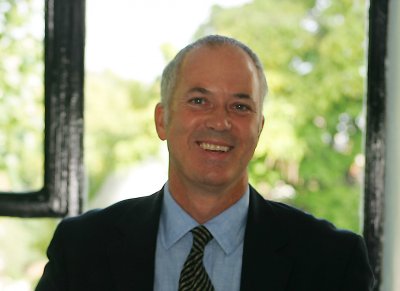
Professor John McVey (pictured) is working with collaborators at the Royal Free London NHS Trust to understand the role of blood coagulation activation and the development of thrombi that occurs in the lungs of patients with Covid-19. They are profiling a range of markers of inflammation, lung and blood vessel damage as well as blood coagulation in the plasma of these patients. It is hoped this will further our understanding of this life-threatening complication of this devastating infection and lead to more effective treatment.
New guidance to support psychological needs of nursing staff during Covid-19 pandemic
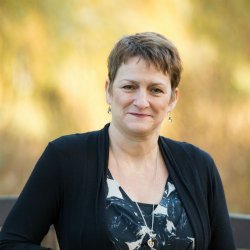
Professor Jill Maben (pictured) and Dr Cath Taylor with Professor Jackie Bridges from the University of Southampton identify the stressors and challenges nurses face during the Covid-19 pandemic and have developed guidance offering strategies for nursing team members across health and social care settings to support their psychological wellbeing. The importance of peer and team support is highlighted in the guidance and outlines what managers, organisations and leaders can do to support nurses at this most critical of time.
Developing a point-of-care Covid-19 test

Dr Anil Fernando (pictured) from CVSSP is working with Professor Roberto La Ragione, Dr Dan Horton and colleagues from the School of Veterinary Medicine and scientists from Lancaster University and Brunel University London to develop an inexpensive, rapid, point-of-care diagnostic test that can inform people if they have Covid-19 in 30 minutes. A mobile-based app for the device can control it, track users’ movements and contact anyone who has had a close interaction with a diagnosed person.
Doctoral researcher contributes to national taskforce on mental health
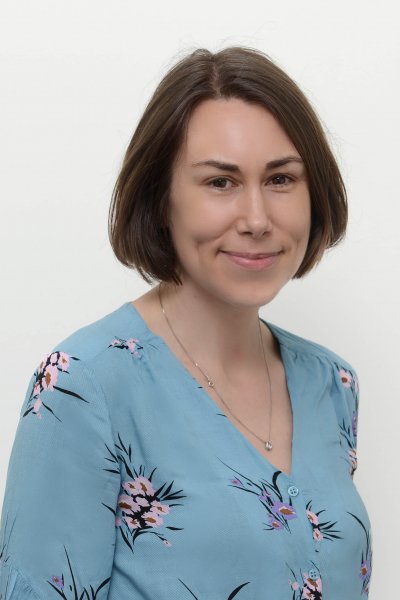
Emma Wadey has temporarily interrupted her PhD write-up to fulfil a role as Clinical Lead for the National Mental health and Learning Disability & Autism COVID-19 response cell, providing clinical advice and oversight. Emma is Head of Mental Health Nursing in NHS England and NHS Improvement and has been supervised by Professor Sara Faithfull and Dr Anne Arber.
Doctoral researcher pauses PhD to return to clinical practice

Duncan Hamilton, a newly-registered nurse, has continued working in clinical practice on a local respiratory ward. Duncan has co-authored an article in Nursing Standard about ethical practice during the pandemic and acknowledged in an editorial on staff wellbeing in the Journal of Clinical Nursing. Duncan is supervised by Professor Jill Maben and Dr Cath Taylor in the School of Health Sciences.
Studying how different types of face masks can protect from the infection of SARS-CoV-2 in public built spaces
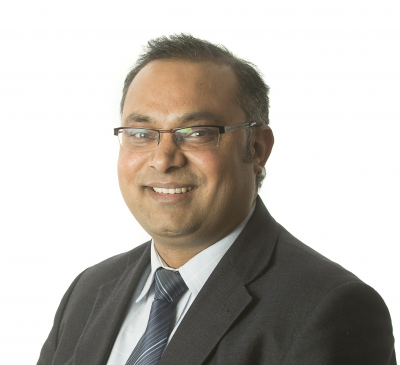
In response to the current global public health crisis, Professor Prashant Kumar (pictured) plays an active role in the clean air community. Currently, he is participating in two Royal Society Rapid Assistance in Modelling the Pandemic (RAMP) volunteer initiatives and is part of an international effort making a case for the recognition of airborne transmission. Among others, his team is studying the impact of lockdown on air quality in different cities, including ODA countries, and how different types of face masks can offer protection from the infection of SARS-CoV-2 in public built spaces.
The impact of positive psychology interventions on well-being during the Covid-19 lockdown
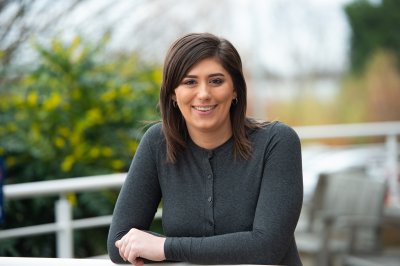
Amelia Dennis (pictured) and Professor Jane Ogden from the School of Psychology are assessing predictors of well-being alongside the effectiveness of positive psychology interventions at increasing well-being under lockdown. In particular, they are exploring whether focusing on the past (through nostalgia), or the present (through gratitude) or the future (through best possible self) is most effective at improving well-being at this time.
Investigating the contribution of lockdown measures during the Covid-19 outbreak
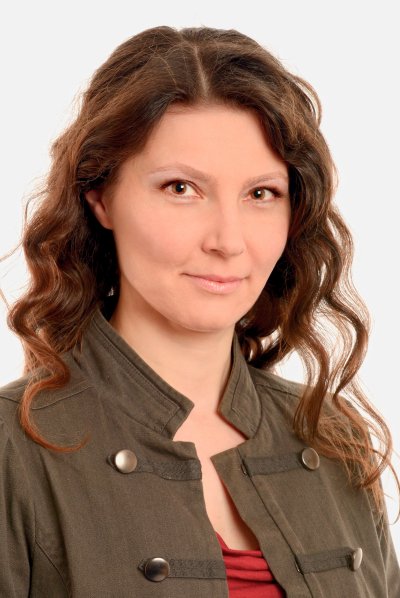
Professor Inga Prokopenko (pictured), Mr Kostiantyn Rudomotkin, Dr Marika Kaakinen and Dr Zhanna Balkhiiarova are investigating the contribution of lockdown measures, including social distancing for prolonged period of time during the Covid-19 outbreak. POSEIDON-PHACT study implements an online questionnaire about individual physical activity and wellbeing . This international multi-centre study already collected data from 625 respondents and will enable the development of preventive measures to maintain individual psycho-physical health.